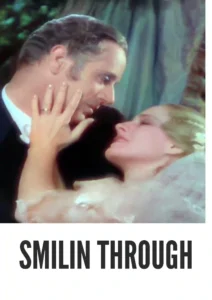Video Sources 0 Views

Synopsis
Love, Loss, and Loyalty: Smilin’ Through (1932) in Vibrant Color

Step into the enchanting world of Smilin’ Through, a romantic fantasy classic from 1932, now beautifully colorized for a viewing experience like never before. Starring Norma Shearer and Fredric March, this film weaves a tale of enduring love that transcends time and tragedy. Perfect for classic film aficionados and those who cherish heartwarming stories, this HD download brings a touch of magic to your screen.
Smilin’ Through Storyline: A Love Story That Defies Time
Smilin’ Through tells the poignant story of Sir John Carteret, who raises his orphaned niece Kathleen as his own daughter. His life is shadowed by the tragic death of his bride on their wedding day, caused by a drunken guest. When Kathleen falls in love with a young man who resembles the man who killed Sir John’s bride, long-buried emotions resurface.As Kathleen navigates her love life, the past and present intertwine, exploring themes of forgiveness, loyalty, and the enduring power of love. The film beautifully portrays the impact of past traumas on present relationships, culminating in a resolution that emphasizes the importance of letting go and embracing happiness. Smilin’ Through is a heartwarming and visually stunning film that explores the complexities of love and loss.
Movie Cast
The film features a stellar cast of actors who bring this timeless story to life:
- Norma Shearer as Kathleen/Moonyean
- Fredric March as Kenneth Wayne/Jeremiah Wayne
- Leslie Howard as Sir John Carteret
Movie Genre
Smilin’ Through falls into the genre of romantic fantasy, blending elements of romance, drama, and the supernatural. Its themes of love, loss, and redemption resonate deeply, making it a beloved classic.
Historical Context: A Sentimental Favorite During the Depression Era
Released in 1932, Smilin’ Through was a popular film during the Depression era, offering audiences an escape into a world of romance and sentimentality. The film was based on a successful play, and its themes of enduring love and overcoming adversity resonated with audiences during difficult times. Smilin’ Through showcases the cinematic trends and storytelling conventions of early Hollywood, reflecting the cultural values and emotional needs of its time.
Colorization Details
This colorized version of Smilin’ Through has been meticulously restored using modern digital techniques, enhancing the visual appeal while preserving the film’s original emotional depth. The colorization process involved carefully analyzing the grayscale tones of the original black and white footage and assigning appropriate colors to each scene. This painstaking process brings new life to the characters and settings, making the story even more captivating for modern audiences. While the merits of colorizing classic films may be debated, it introduces these films to a broader audience, ensuring their legacy for future generations.
Technical Details
- Director: Sidney Franklin
- Screenplay: Ernest Vajda, Claudine West, Donald Ogden Stewart, James Bernard Fagan
- Based on: the play by Jane Cowl and Allan Langdon Martin
- Cinematography: Lee Garmes
- Edited by: Margaret Booth
- Production Company: Metro-Goldwyn-Mayer (MGM)
- Distributed by: Metro-Goldwyn-Mayer (MGM)
- Runtime: 98 minutes
Technical Specifications
- Download Format: MP4
- Resolution: HD (1080p)
- Compatibility: Compatible with most devices, including smartphones, tablets, computers, and smart TVs.
Reviews and Critical Reception
Smilin’ Through (1932) is celebrated for its heartwarming story, strong performances, and beautiful cinematography. As a sentimental favorite from the early days of Hollywood, the film has touched generations of viewers with its themes of love, loss, and forgiveness. Smilin’ Through remains a testament to the power of classic storytelling and the enduring appeal of romantic dramas.
FAQs
- Q: What is Smilin’ Through about?
- A: Smilin’ Through is a romantic fantasy about a man haunted by the past who must come to terms with his niece’s love for a young man connected to his tragedy.
- Q: Is Smilin’ Through (1932) a well-known classic film?
- A: Yes, Smilin’ Through is a beloved classic film known for its romantic story and strong performances.
- Q: Is this version of Smilin’ Through colorized?
- A: Yes, this version has been professionally colorized to enhance the viewing experience.
- Q: What makes Smilin’ Through interesting for classic film fans?
- A: Smilin’ Through offers a glimpse into the sentimental storytelling and cinematic trends of early Hollywood.
- Q: What is the download format?
- A: The download format is MP4, which is compatible with most devices.
- Q: What resolution is the download?
- A: The resolution is HD (1080p), providing a high-quality viewing experience.
Download Now in HD!
Watch Smilin’ Through Today!














